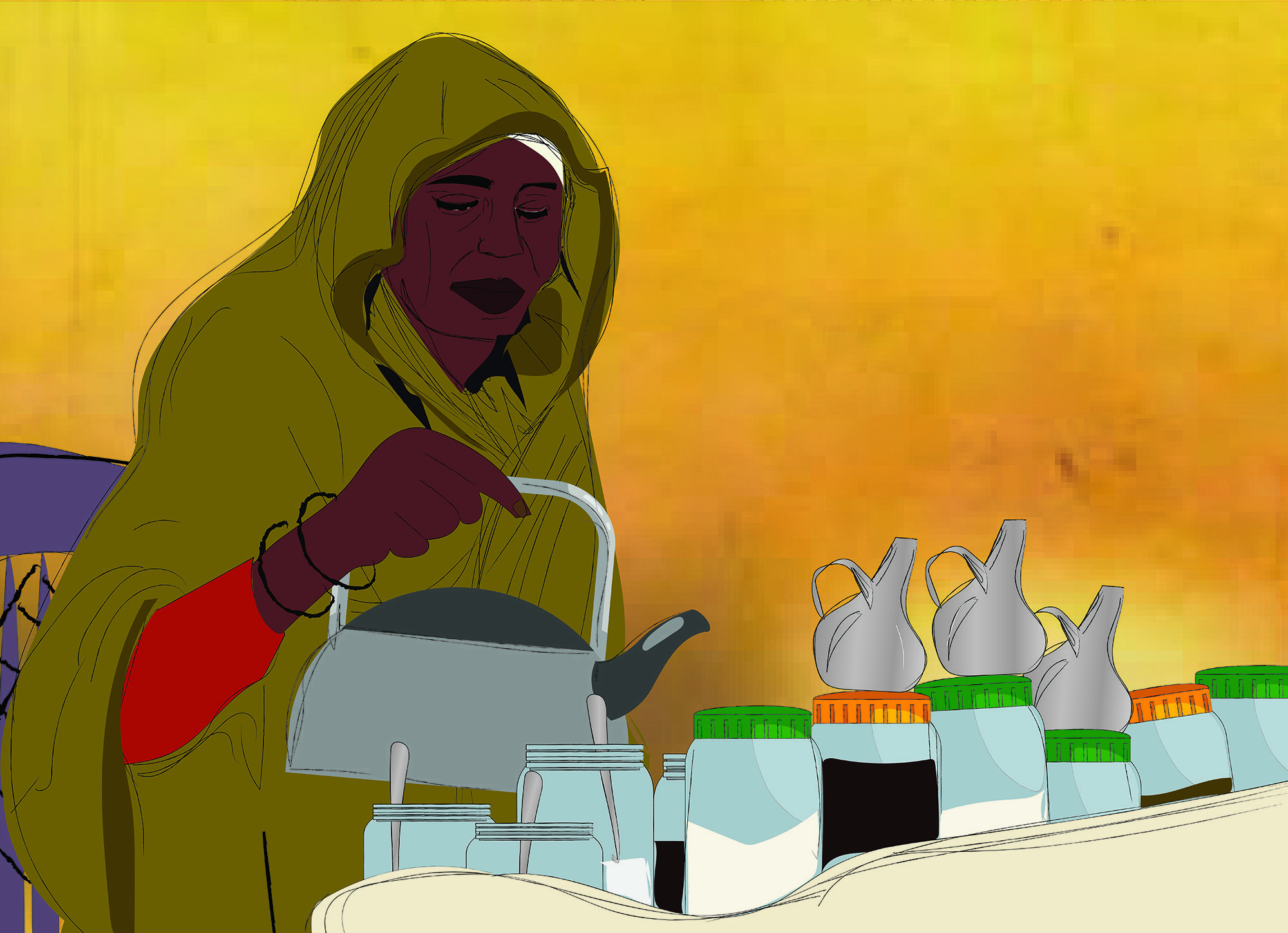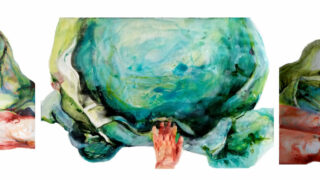
This publication has benefited from the support of the Rosa Luxemburg Foundation. This text may be reproduced in part or in full, provided the source is acknowledged.
Muna (28) struggles to own a tea tarabiza that generates an income she doesn’t have to share. She hails from the region of Kordofan and works in Khartoum’s street markets, in partnership with another tea seller. Her work begins at sunrise and ends at sunset. She resorted to selling tea after her husband joined a rebel movement nine years ago, leaving in her care two children, in addition to the burden of caring for her mother and her maternal aunt, who is afflicted with a financially- demanding disease.
But Muna doesn’t have her own tarabiza to sell tea. A tarabiza is a stand consisting of some pots, a traditional stove, and some chairs for the customers. Unable to cover these costs by herself, she equally splits her income with another woman. Muna would need about 10,000 Sudanese Pounds, or more than $125 (1), to have her own tarabiza.
Muna’s tragedy doesn’t stop at her meager income and the burden of caring for her family. Due to economic hardship, her father had married her off when she was a young girl to an older, married man, with whom she lived for a few years, before he moved to rebel-held areas and went incommunicado. Muna later found out that he had remarried, and so she’s in a state of limbo, neither married nor divorced. Unable to cover the legal costs of filing for divorce in absentia, she saves her money to provide for her two children, her mother, and her aunt.
Muna’s case is not unique among tea sellers in Sudan. Behind every cup is a painful story and an extended family that the woman selling the tea has to support in silence, in patience, and with a bright smile in the face of life - all while enduring the tyranny of the authorities and the cruelty of a society that places the heaviest of burdens on women’s shoulders while expecting them to be saints.
A refuge for poor women across Sudan
For many poor women in Sudan, selling tea on the highways, in the markets, and in front of hospitals and public facilities is the preferred job of choice. Even if women face many troubles on the job, including being chased by local authorities, selling tea has its benefits. In addition to providing for a reasonable income in comparison to other precarious labour, selling tea is a freelance job, which means the women can divide their time between work and domestic chores, they can move from place to place depending on their customers, and if the job is near a market, that’s even better.
The Slums of Khartoum: On Life’s Edge
21-05-2022
The local authorities estimate the number of tea sellers in the state of Khartoum at 23,000 stationary saleswomen. According to a 2013 study prepared by the Ministry of Social Development in the state of Khartoum that covered 13,000 tea saleswomen in the capital, 46.8% of them are married. A large portion of these married women, according to study data, includes married women in a state of limbo, who were abandoned by their husbands for economic reasons or otherwise, without being legally divorced. The second largest group, at 19.3%, of these women are single, followed by divorcees and then widows, which make up 19.2% and 14.7% respectively.
Behind every cup is a painful story and an extended family that the woman selling the tea has to support in silence, in patience, and with a bright smile in the face of life - all while enduring the tyranny of the authorities and the cruelty of a society that places the heaviest of burdens on women’s shoulders while expecting them to be saints.
And even though the wars which ripped through the edges of Sudan have led to a steady wave of migration from Darfur, South Kordofan, and the Blue Nile to the centre of the country; widespread poverty has surpassed war and internal displacement as the most common denominator between the tea sellers. In the past, these jobs were commonly a safe choice for the internally displaced and those fleeing conflict zones or areas affected by drought and desertification. In the last few years however, selling tea has attracted more and more women suffering from poverty and deteriorating living conditions. And while the job was previously limited to women from certain ethnicities, which don’t consider a woman leaving the house for work disgraceful, it now accommodates all segments of Sudanese society. It has even attracted women from Ethiopia and Eritrea, who consider Sudan a stepping stone before crossing into Europe.
In the past nine years, Sudan has witnessed its economy shrink dramatically since the separation of South Sudan in 2019 and the subsequent loss of oil revenues and deterioration in the value of the local currency. As a result, economic pressure has increased, with a shortage of jobs in both the private and public sectors, along with rampant corruption and absence of accountability within state institutions. According to “The Strategic Paper to Combat Poverty 2012” (2), more than 65% of the population of Sudan live below the poverty line. As unemployment grows among university graduates, so does the unregulated sector, which has expanded to encompass many economic activities that function under the radar of the formal economy.
In addition to female sellers of food and beverage, the unregulated sector also includes street vendors, domestic workers, labourers in agriculture and animal wealth, in small businesses and in gold mining. An official study (3) attributes the rising number of workers in the unregulated sector to a number of reasons, including migration from rural areas to the cities due to displacement, lack of services and job opportunities; population growth; rising unemployment rates; and the relative decline in human resource capacity due to dropping education levels. Furthermore, economic activity in the unregulated sector doesn’t require advanced skills or technologies, nor does it fall under taxation and licensing laws, and by extension quality and standard controls. On the other hand, poverty is increasing among workers in this sector, who lack social security services and medical and educational insurance. Official statistics (4) estimate that the unemployment rate nationwide has reached 32.1%, out of a population of 41.7 million according to the latest official figures.
Awadiya Koko is one of the most courageous 10 women in the world
The profession of selling tea, which used to be limited to older women, is now markedly dominated by younger women, most of whom are between 30-40 years old. Foreign tea sellers are often even younger, averaging at 15-20 years old, with 53.3% having a primary level education and 27.5% having a university education level. While there is no clear date as to when the profession originated, interest in selling tea as a social phenomenon began in the 1990s. Society had a cruel perception of women tea sellers sometimes amounting to stigmatisation. However, the rise of feminist and intellectual discourse urged a more sympathetic view of tea sellers, which was reinforced by the tyranny of local authorities and the taxation campaigns that they implemented, chasing women down the streets of Khartoum and confiscating their equipment in degrading scenes that have become imprinted in the memory of the Sudanese public, bringing back memories of those campaigns carried out by “Bashi-bazuk” soldiers, the mercenaries and irregular regiments of the Ottoman Army.
Local authorities often fight tea sellers using Public Order and Land Protection laws, carrying out campaigns enforced by the police force or men in civilian clothing. Equipment of tea sellers are confiscated and their workdays disrupted, as they’re asked to pay fines, arbitrarily set by the authorities, ranging from 500-1,000 pounds, and sometimes even reaching 1,500 pounds. A tea seller would have to pay an entire day’s earnings to get her equipment back, and sometimes she would have to borrow money should she encounter law enforcement at the beginning of her workday.
These rabid campaigns have resulted in public sympathy towards sea sellers, with many civil society organisations rushing to their defence in the face of local authorities. Al-Toumah (50 years old), who comes from East Sudan, says she has been working in the profession for more than 20 years and is happy with the change of social outlook towards it. To crown this transformation, Awadiya Koko, a tea seller, was selected by the U.S. Department of State as one of 10 women to receive the International Women of Courage Award in 2016. Awadiya founded The Food and Beverage Vendors Association in 1990, a few years after she became a tea seller in Khartoum in 1986. Among the first workers in the trade, she became an icon among tea sellers. She currently heads the “Multi-purpose Feminist Union Coop”, which brings together about 26 feminist associations representing thousands of female workers in the food and beverage industry. Fully utilising her icon status to improve the conditions of her fellow tea sellers in the trade, Awadiya is now working towards a health insurance project for tea sellers targeting about 10,000 women and their families. Work on this project is currently underway and it was one of the recommendations of a study conducted by the Ministry of Social Development in Khartoum.
Feminist Cooperatives, whose union is headed by Awadiya Koko provide continuous support to member women in the form of urgent intervention in resolving daily problems with the local authorities, raising legal and health awareness, in addition to help in transitioning to other professions for those interested. It is seldom the case that tea sellers prefer other jobs even though they usually say that they were forced into the job. That’s because selling tea covers their expenses. The Director of Social Affairs at the Municipality of Khartoum, Muna al-Fakki, says that her efforts in encouraging some tea sellers with a university degree to change their line of work have failed, even after local authorities provided a number of jobs for them in an attempt to find solutions and alternative opportunities. The difference in monthly income between a government salary and selling tea is a major obstacle. It is estimated that the daily income of tea sellers in touristic areas, such as Al-Nile Street, can reach up to 2,000-2,500 Sudanese pounds, which is about $30 a day, or the monthly salary for a government employee! While in less crowded areas the daily income falls between 700-1,000 Pounds, which is about $10.
Entertainment at an affordable price
Modernity has turned some tea centres in Khartoum to entertainment districts, visited by hundreds every day, especially in the evenings. An area like Al-Nile Street in Khartoum, for example, is crowded with tea sellers along the Nile bank which stretches from Khatroum to Omdurman, attracting families and young people alike. In indoor cafes or open stalls, tea sellers offer a selection of hot drinks, from tea to Nescafe and Ovaltine, usually at higher market prices when compared to less crowded areas. To attract more customers, some tea sellers also added pastries to their menu. For example, Amira is one of Khartoum’s most famous tea sellers, who converted her area in the luxurious neighbourhood of Al-Amarat into a landmark entertainment district. As the median income of the Sudanese decreases, many opt to spend their free time where tea is offered at more reasonable prices in comparison to those charged by cafes and restaurants. Khartoum lacks touristic and entertainment attractions due to the 30 year rule of the islamists, and that has had a positive impact on the profession of selling tea in the streets.
The rise of feminist and intellectual discourse urged a more sympathetic view of tea sellers, which was reinforced by the tyranny of local authorities and the “taxation” campaigns that they implemented, chasing women down the streets of Khartoum and confiscating their equipment in degrading scenes that have become imprinted in the memory of the Sudanese public, bringing back memories of those campaigns carried out by “Bashi-bazuk” soldiers.
For tea sellers, the fall of Al-Bashir’s regime, which had exhausted them with the fees it imposed, was met with a sigh of relief. This is especially true since the Transitional Government cancelled the Public Order Law which extensively targeted them. Even though there is a law that protects and regulates this profession, local authorities used the pretext of Public Order and Land Protection laws to collect endless fines from tea sellers. Today, campaigns against tea sellers and street vendors have ceased, but the profession continues to attract many women who are still in need of regulation and legal protection.
Local authorities consider tea stalls as a form of visual and spatial pollution. Their programs have thus far been unsuccessful in their attempts to make a shift in this profession or upgrade it even if only in terms of appearance. It has remained a constant source of controversy between local authorities and human rights activists. For example, with the objective of improving the aesthetic of street facades, the authorities attempted to restrict tea sellers to kiosks, which are small and mobile stalls made of metal, equipped with a gas powered stoves instead of the traditional stoves which use coal, demanding a designated area that that separates the tea seller from the customers. This project however did not succeed as it adversely affected the number of customers. A survey of tea sellers found that 33.7% of them prefer kiosks, but the majority still prefer the tarabiza.
After the December revolution of 2018, which brought the downfall of Al-Bashir’s regime, every Sudanese was hopeful. The economy was the decisive factor that brought down Al-Bashir, and it is still the major concern of every Sudanese hoping to escape the bottle neck. Tea sellers are among many other precarious labourers who struggle to secure their basic daily livelihood in the unregulated economy. After the revolution, all they want is to work in peace, and to receive basic services such as health insurance, without the pressure of campaigns targeting them. They aspire for the economy to improve and for their children, whose education was paid for by the long hours each of them spends on the road, to have better job opportunities.
The content of this publication is the sole responsibility of Assafir Al-Arabi and Rosa Luxemburg Foundation cannot accept any liability for it.
Translated from Arabic by Serene Husni
Published in Assafir Al-Arabi on 24/02/2020
1- According to the black market exchange rate which is 80 Sudanese Pounds to 1 U.S. Dollar at the time of writing this article.
2- The paper was previously published by Sudan’s official news agency (SUNA).
3- “Policies and Mechanisms to Address the Impacts of an Unregulated Sector, and Improve the Conditions of its Workers.” (AR)
4- Report issued by the Ministry of Finance in 2017.





